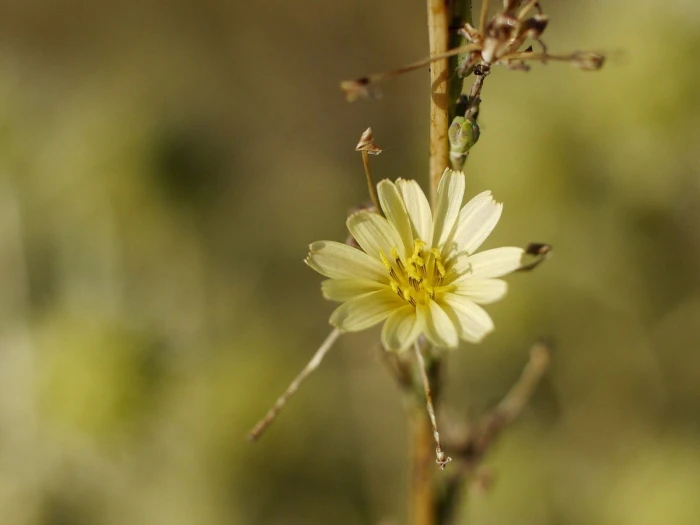Willowleaf Lettuce
/
(Lactuca saligna)
Willowleaf Lettuce (Lactuca saligna)
/

© Roman
CC BY 4.0
Image By:
© Roman
Recorded By:
Copyright:
CC BY 4.0
Copyright Notice:
Photo by: © Roman | License Type: CC BY 4.0 | License URL: http://creativecommons.org/licenses/by/4.0/ | Uploader: efarilis | Publisher: iNaturalist |













Summary
Lactuca saligna, commonly known as willowleaf lettuce or least lettuce, is an annual herb that is native to a variety of habitats in Eurasia, including open woodlands, grasslands, and disturbed areas. It has been introduced to North America, where it can be found in similar disturbed habitats. This plant typically grows up to 3 feet tall and features spindly, erect stems with long, narrow, willow-like leaves. The inconspicuous yellow flowers bloom in the summer and are followed by small, dandelion-like seed heads.
Willowleaf lettuce is not commonly cultivated but may be of interest for naturalized areas or wildflower gardens where it can be allowed to self-seed. It is drought-tolerant and can thrive in poor, well-drained soils, making it suitable for xeriscaping. In cultivation, it requires minimal care, thriving in full sun to part shade. However, gardeners should be cautious as Lactuca saligna can become weedy and potentially invasive outside its native range. It is advisable to check local regulations before planting to ensure it is not considered invasive in your area.CC BY-SA 4.0
Willowleaf lettuce is not commonly cultivated but may be of interest for naturalized areas or wildflower gardens where it can be allowed to self-seed. It is drought-tolerant and can thrive in poor, well-drained soils, making it suitable for xeriscaping. In cultivation, it requires minimal care, thriving in full sun to part shade. However, gardeners should be cautious as Lactuca saligna can become weedy and potentially invasive outside its native range. It is advisable to check local regulations before planting to ensure it is not considered invasive in your area.CC BY-SA 4.0
Plant Description
- Plant Type: Herb
- Height: 1.5-3 feet
- Width: 0.5-1 feet
- Growth Rate: Moderate
- Flower Color: Yellow
- Flowering Season: Summer
- Leaf Retention: Semi-deciduous
Growth Requirements
- Sun: Full Sun, Part Shade
- Drainage: Medium, Fast
Common Uses
Edible*Disclaimer: Easyscape's listed plant edibility is for informational use. Always verify the safety and proper identification of any plant before consumption., Low Maintenance
Natural Habitat
Native to a variety of habitats in Eurasia, including open woodlands, grasslands, and disturbed areas
Other Names
Common Names: Willowleaf Lettuce
Scientific Names: Lactuca saligna, Chondrilla crepoides, Hieracium salignum, Lactuca adulteriana, Lactuca adulterina, Lactuca angustifolia, Lactuca caucasica, Lactuca caucasica var. caucasica, Lactuca caucasica var. major
GBIF Accepted Name: Lactuca saligna
